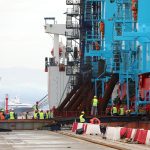ZAGREB, May 19, 2018 – Migrants who had waited several hours at the administrative boundary between Sarajevo and Herzegovina-Neretva cantons in Bosnia and Herzegovina finally arrived at a refugee camp in the southern city of Mostar on Friday afternoon, after fierce arguments between central and local government officials earlier in the day about who authorised the transfer of the refugees from a makeshift tent settlement in Sarajevo to the Salakovac camp in Mostar.
The five-bus convoy, travelling under police escort, arrived at the Salakovac camp shortly after 3pm. The camp has become a temporary asylum centre for migrants who are now coming to Bosnia and Herzegovina and applying for asylum en masse.
The first serious attempt by authorities to control illegal migration and accommodate refugees adequately turned into a major political crisis as officials at various government levels accused each other of a ‘coup d’etat’ and an attempt to draw the border of a “third entity.”
A group of about 250 migrants who had been living in a makeshift tent settlement in a downtown park in Sarajevo were to be transferred to Salakovac on Friday under a state parliament decision. The buses, however, were stopped half way on the orders of Herzegovina-Neretva Canton authorities, which Security Minister Dragan Mektić described as a “coup d’etat’.
The director of the Salakovac camp Edin Denjo explained that the migrants would be registered and after that would be assigned the status of asylum seekers.
Local media has reported that local residents near the camp mostly approve of migrants coming to the camp but some have also expressed fear.
Deputy Prime Minister Vjekoslav Bevanda said that the government had not made any decision regarding the migrants being transferred to Salakovac and added that Bosniak and Serb government officials were deceiving the public. He denied claims by Prime Minister Denis Zvizdić and Security Minister Mektić that the decision to activate the Salakovac camp was adopted at the last cabinet meeting.
Mektić said earlier that everything was agreed with the Mostar police and then “without any due cause” a secret action was conducted by armed police from Herzegovina-Neretva Canton who intercepted the bus convoy. He added that cantonal police threatened the official escort with weapons and added that the State Investigation and Protection Agency (SIPA) would react and has reported the incident to the State Prosecutor.
The head of the Herzegovina-Neretva Canton government Nevenko Herceg said that authorities in Mostar had not been contacted or consulted about the possible transfer of any larger group of migrants to the Salakovac camp. “This is a typical example of not respecting the constitutional structure of Bosnia and Herzegovina and an attempt to destabilise the canton,” Herceg’s office said in a press release.
Several parties, particularly in the opposition, have reacted to the latest developments claiming that the Croat HDZ BiH party was in fact in control of official institutions and this latest incident was evidence of the attempt to set up a third, Croat-majority entity and that the spot where the bus convoy was stopped was in fact the boundary of the “third entity.”







